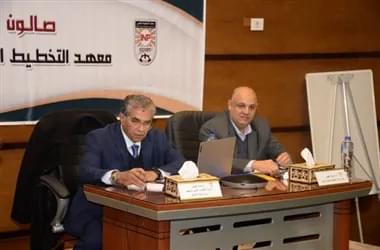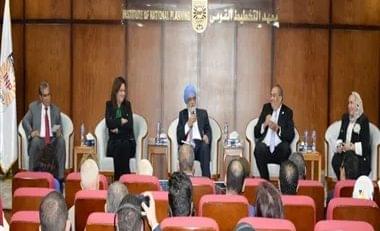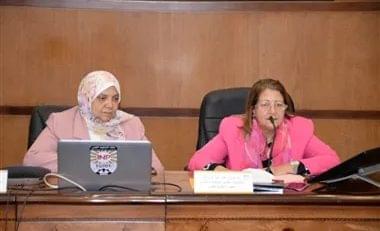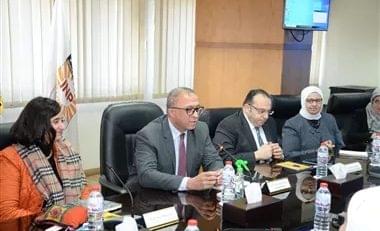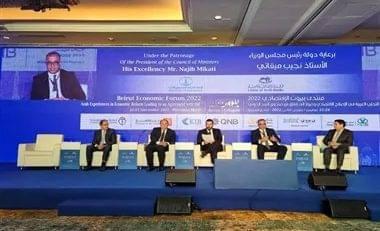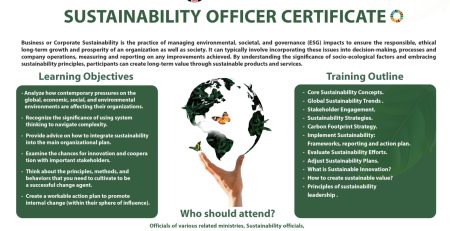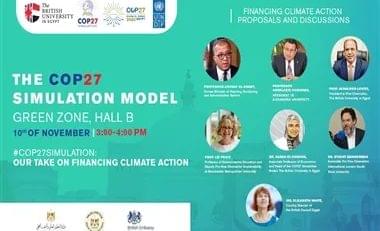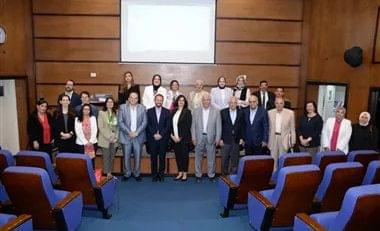The Environmental Planning and Development Center at the Institute of National Planning discusses the most important outputs of the COP27 Climate Change Conference.
Director of the Environmental Planning and Development Center at the National Planning Institute: The agricultural sector is one of the sectors most affected by climate change.
Dr. Khaled Fahmy: One of the most important outcomes of the COP27 conference is reaching a consensus on losses, damages, and compensation for communities affected by climate change.
Under the title “The Most Important Outputs of the COP27 Climate Change Conference,” the Environmental Planning and Development Center at the Institute of National Planning held a symposium
by Prof. Dr. Khaled Fahmy, Professor of Environmental Economics at the Institute and former Minister of Environment, and the symposium was moderated by Prof. Dr. Khaled Attia, Director of the Center, with the participation and attendance of a group of professors, members of the scientific body from the Institute and outside it.
In his speech during the symposium, Dr. Khaled Attia said that the most important feature that distinguishes the climate change conference that was held recently compared to the previous editions of the conference is its focus primarily on the rapid transformation of implementation and application, because since the Paris Agreement of 2015, the pace of implementation has not been as hoped for as it was previously agreed upon.
Dr. Attia pointed out that one of the most important outcomes of the COP27 conference is the request of developed countries to move quickly to assist developing countries in many issues, including the need to find new and innovative financing methods to treat the impact of climate change for these countries with the help of the private sector and international organizations, as well as work to assist developing countries in finding Clean energy sources and lower prices, along with food security issues.
Dr. Attia added that the agricultural sector is one of the sectors most affected by climate change, hence the need to change the patterns of consumption behavior of individuals in line with the gap that exists in the current period, in addition to issues of water security, climate change and sustainability.
For his part, Prof. Dr. explained. Khaled Fahmy said that discussing the activities and outputs of the COP27 Climate Change Conference is an important matter in order to find out what has been reached regarding the application of its outputs, and to try to conclude and predict what will happen in COP28 and the conferences that follow.
During the symposium, Fahmy reviewed the current state of the global climate and the justifications for adherence to the 1.5°C target, as the latest report of the International Committee on Climate Change 2022 indicated that the world is expected to reach the level of 1.5°C during the next two decades, pointing to the report’s emphasis on the need to adhere to 3 Of particular importance are measures to abandon the use of fossil fuels, to make changes in dietary habits, and to move towards greener cities.
Dr. Khaled Fahmy touched on the results of the COP26 climate summit in Glaxo, which aimed to cut emissions in half by the end of 2030, reviewing the conclusions reached by all parties at the end of the conference and the consequent environmental policies in some countries.
He explained that one of the most important outputs of the COP27 Conference of the Parties was reaching consensus on losses, damages and compensation for communities affected by climate change, referring to what was done under Article 6 of the Paris Climate Agreement in 2015 related to carbon trade, as the COP27 conference witnessed talks on carbon markets with concerns about How to include decarbonization in new, opaque markets.
In addition to the above, Fahmy addressed some of the pioneering environmental initiatives in Egypt, such as the issuance of green bonds as one of the forms of green financing to finance sustainable projects related to the environment and climate in many sectors such as clean energy projects, smart transportation, sea water desalination, sewage, and other projects that support green transformation.

